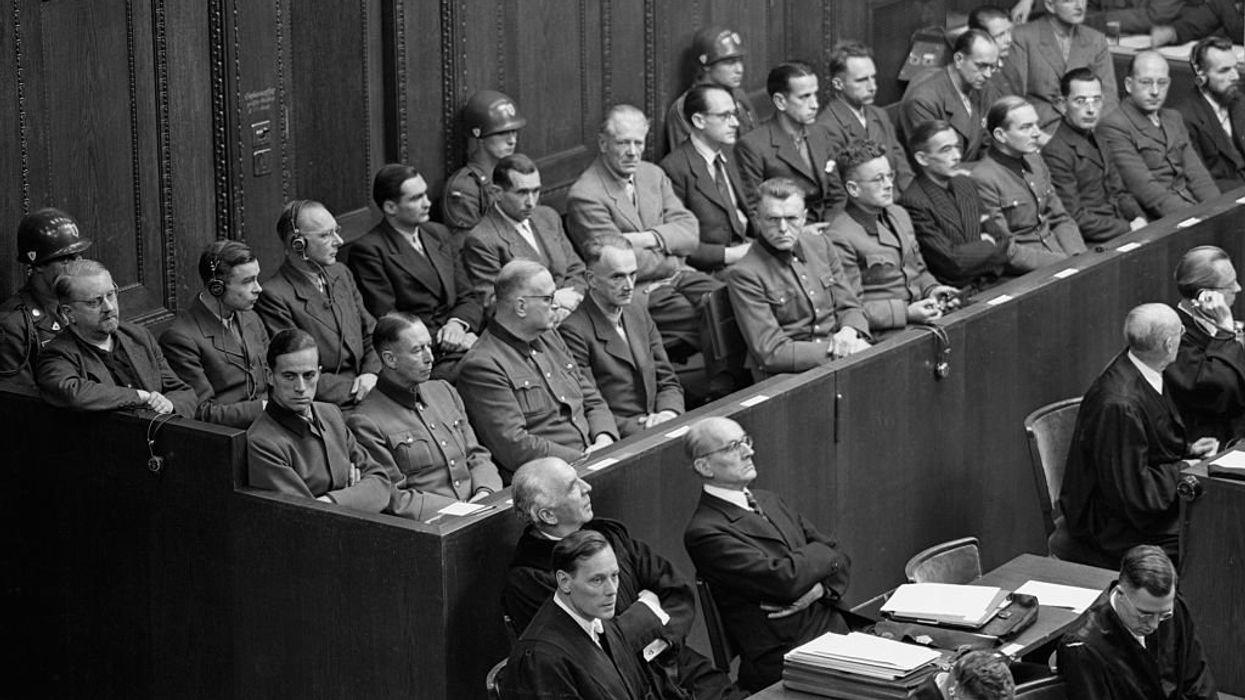
Twenty-three German doctors and scientists during their arraignment on charges of inhuman experimentation on inmates of Nazi concentration camps. (Getty images)

The Lancet, the world's highest-impact academic journal, has released an expansive and damning report concerning the "history of Nazi medicine and its central role in the so-called Final Solution."
In addition to highlighting various ethical lessons for health professionals today, the report published Wednesday by the Lancet Commission on Medicine, Nazism, and the Holocaust busts various myths, including the notion that there were only a handful of extreme Nazi doctors and scientists. Rather, over half of German doctors were Nazis, and many were complicit in the inhumanities for which the Third Reich is infamous.
What's more: The German medical establishment apparently convinced itself that in committing inhumane and murderous research, it was following the science — science thought settled and championed by so-called experts and activists, not just in Germany but throughout the Western world.
In the early 20th century, Nazis inflicted nightmarish experiments and acts of violence on Jews, gypsies, political prisoners, prisoners of war, the disabled, the mentally ill, and others and ultimately went on to systematically slaughter millions. The report makes clear that health professionals played a critical role in "formulating, supporting, and implementing inhumane and often genocidal policies."
"The political objective of improving the biological quality of a given population motivated research programmes, and science provided legitimisation for social policy, medical interventions, and public health interventions," said the report. "Biology and medicine provided concepts that were used to interpret contemporary social and political problems and to develop policies in response."
Not only were "science, medicine, and public health ... used to justify and implement persecutory policies and eventually state-sanctioned mass murder and genocide," but health practitioners willingly took part throughout all stages of the bloodletting.
For instance, German doctors reportedly helped prepare legislation for forced sterilization, which was performed on between 310,000 and 350,000 victims deemed "genetically inferior." Another 230,000 people with mental disabilities deemed unworthy of living were exterminated under programs that have recently been resurrected in modified forms in countries such as Canada. Health professionals offered their "killing expertise" to the death camps, where millions were massacred. Doctors routinely performed forced experiments on dead and living victims.
It was not SS special units or soldiers who conducted the child murder program, Aktion T4, the T4 special campaign against Jews, Aktion Brandt, and other such medical slaughter campaigns, but rather willing doctors and nurses.
"Few health professionals openly refused to collaborate in any of these activities, those who did not collaborate were rarely sanctioned," said the report.
Another pervasive myth the commission flagged was that Nazi medicine was pseudoscience and regarded as such by civilized nations; that it was somehow divorced from internationally accepted standards, norms, and practices.
"The Nazi regime in Germany and its alliance with medicine did not arise in a vacuum: German medical scientists were part of international networks exploring and promoting eugenics and developing medical rationales for racist beliefs and practices in many nations. These international networks lent an air of legitimacy to German scientists, who pushed the tenets of medical racism and eugenics to their extremes and contributed to the scientific legitimisation of the virulently antisemitic and racist policies of the Nazi regime," said the report.
Racist eugenics was especially popular throughout the Anglosphere. The founder of Planned Parenthood, Margaret Sanger; the founder of Canada's health care system, Tommy Douglas; and one of the founding fathers of British socialism, George Bernard Shaw, were among the many Western intellectuals gung-ho for eugenics.
Not only were some of the initiatives unleashed in Germany widely supported abroad, they were also practiced abroad. Forced sterilization was, for instance, legalized in Indiana in 1907, then spread to other American states. The U.S. Supreme Court declared sterilization laws constitutional in Buck v. Bell, ultimately paving the way for the sterilization of at least 64,000 handicapped Americans.
In effect, the Nazis took monstrous ideas pervasive throughout the international medical establishment, coupled them with their particular statist agenda, and took them to extremes, effectively exposing those ideas for what they were and those who held them elsewhere for what they were really asking for.
The commission recognized that significant dangers remain inherent in modern medicine, including the willingness to dehumanize patients and temptations to "abandon basic values for ideological and opportunistic reasons."
Glossing over recent controversies, the commission noted, "Contemporary health professionals might rarely or never face similarly challenging situations, but given wars, political radicalisation, pandemics and natural disasters globally, many will encounter circumstances that challenge their consciences and ethical principles. Many health professionals will also feel pressure — from the state, an employer, a superior, or others — to compromise the safety and wellbeing of their patients."
While critical of parallels drawn between Nazi- and pandemic-era medical establishments, the commission nevertheless concluded, "Courage, resistance, and resilience are necessary to prevent and counteract potential abuses of trust, power, and authority in health care. ... Health professional practice and the pursuit of scientific knowledge should occur within a framework that prioritises individuals' human rights."
Like Blaze News? Bypass the censors, sign up for our newsletters, and get stories like this direct to your inbox. Sign up here!